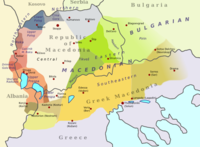This is an old revision of this page, as edited by BalkanFever (talk | contribs) at 09:52, 28 July 2008 (oh hell no. you are disgustingly biased. please hold while i vomit. seriously, stay away). The present address (URL) is a permanent link to this revision, which may differ significantly from the current revision.
Revision as of 09:52, 28 July 2008 by BalkanFever (talk | contribs) (oh hell no. you are disgustingly biased. please hold while i vomit. seriously, stay away)(diff) ← Previous revision | Latest revision (diff) | Newer revision → (diff)The term Maleševo-Pirin dialect (sometimes spelt Maleshevo) is used in South Slavic linguistics to refer to a group of related varieties that are spoken on both sides of the border between Bulgaria and the Republic of Macedonia. They are linguistically transitional between the two national languages Bulgarian and Macedonian and form part of the larger dialect continuum between them. The dialect group is named after the mountain ranges of Pirin in Bulgaria and Maleševo in Macedonia. When referring specifically to the dialects on the Bulgarian side, the term Petrich-Blagoevgrad dialect, after the two major towns in the area, is also used. Macedonian linguistics tends to treat the whole group as part of the Macedonian language, classifying it as part of a southeastern group of Macedonian dialects, whereas from the perspective of Bulgarian linguistics, the varieties in Bulgaria are classified as parts of the eastern subgroup of the southwestern group of Bulgarian. This dialect is spoken in the towns of Delčevo, Pehčevo, Berovo and the surrounding villages in the east of the Republic of Macedonia, and in the regions of Blagoevgrad, Petrich and Sandanski in Bulgaria.

The Blagoevgrad-Petric dialect is also closely related to the neighbouring Kyustendil and Samokov dialect, and especially to the Dupnitsa dialect,
whereas the Maleshevo dialect is closely related especially with the Štip-Strumica dialect.
Linguistic properties
The following is a table of distinctive phonological and grammatical features, comparing the values found in the Maleshevo and Blagoevgrad-Petrich dialects with Standard Bulgarian, Standard Macedonian and two other neighbouring Western Bulgarian dialect areas.
|
As shown by the table, the Maleshevo and the Blagoevgrad-Petrich dialect show mixed Bulgarian and Macedonian phonological traits and mostly Bulgarian grammatical traits (several instead of one conjugation, single definite article, formation of past perfect tense with бeх, etc.), with the Maleshevo dialect ranging mostly towards Macedonian and the Blagoevgrad-Petrich dialect ranging mostly towards Bulgarian (cf. table). The transitional nature of the dialect is further demonstrated by the reflexes of the Proto-Slavic *tʲ/*dʲ: from the typically Bulgarian щ/жд (ʃt/ʒd) in the Blagoevgrad-Petrich dialect and the far East of the Maleshevo dialect, along the border with Bulgaria, through the transitional шч/жџ (ʃtʃ//dʒ/} in the central parts, and to the typically Macedonian ќ/ѓ (c/ɟ) in the western parts of the Maleshevo dialect
Other phonological characteristics
- shortening of the words
- use of the plural suffix -ove as in Bulgarian instead of -ovi as in Macedonian: клучове ('keys')
- use of the old consonant group caf- instead of the consonant group cv-: цев- цаф (cev, 'pipe')
- use of /v/ at the beginning of the word as in Bulgarian instead of /j/ as in Macedonian: важе ('rope')
Morphological characteristics
- use of the preposition sus: - сус рака ('with the hand');
- the clitic possessive forms follow the verb: му рече - рече му ('He told him');
- use of the dative form with na: на нас ни рече ( na nas ni reche, 'He told us')
- the form of the verb to be for third person plural is sa as in Bulgarian, instead of se as in Macedonian: тие се - тие са (tie se, 'they are')
- use of the pronoun on instead of toj
Examples of the dialect
- Traditional song from Maleševo-Pirin region:
Излегол Яне прошетал, леле
низ таа Пирин Планина
низ таа Пирин Планина, леле
низ тоа поле широко.
Нарамил пушка на рамо
настранил капа на чело
на пат ми сретна овчарче, леле
на овчарче вели, говори.
Овчарче младо чобанче, леле
дали я виде четата
дали я виде четата, леле
четата на Яне Сандански.
Видело сум я слушнало, леле
сега за Яне збореа
каде е Яне Сандански, леле
четата да си прибере.
References
- ^ Sussex, Roland (2006). The Slavic Languages. Cambridge University Press. pp. p.510. ISBN 0521223156.
{{cite book}}:|pages=has extra text (help); Unknown parameter|coauthors=ignored (|author=suggested) (help) - Стойков, Стойко (2006). Българска диалектология. Акад. изд. "Проф. Марин Дринов".
- ^ str. 249- 252 Makedonski jazik za srednoto obrazovanie- S.Bojkovska, D.Pandev, L.Minova-Ǵurkova, Ž.Cvetkovski- Prosvetno delo AD- Skopje 2001
- ^ Стойков, Стойко (2006). Българска диалектология. Акад. изд. "Проф. Марин Дринов".
- V. Friedman, "Macedonian", in: B. Comrie and G. Corbett (eds.), The Slavonic Languages, New York: Routledge, p. 247
- ^ The sociolinguistics of literary Macedonian, VICTOR A. FRIEDMAN, THE UNIVERSITY OF CHICAGO LIBRARY
| Dialects of the Bulgarian language | |||||||
|---|---|---|---|---|---|---|---|
| Eastern |
| ||||||
| Western |
| ||||||
| Also considered a dialect of Macedonian. | |||||||
| Dialects of Macedonian | ||||||
|---|---|---|---|---|---|---|
| Western |
|  | ||||
| Northern |
| |||||
| Southeastern |
| |||||
| Also considered a dialect of Bulgarian. Considered to be a part of the transitional Torlak dialect and as a subdialect of Bulgarian, Macedonian, and Serbo-Croatian. | ||||||